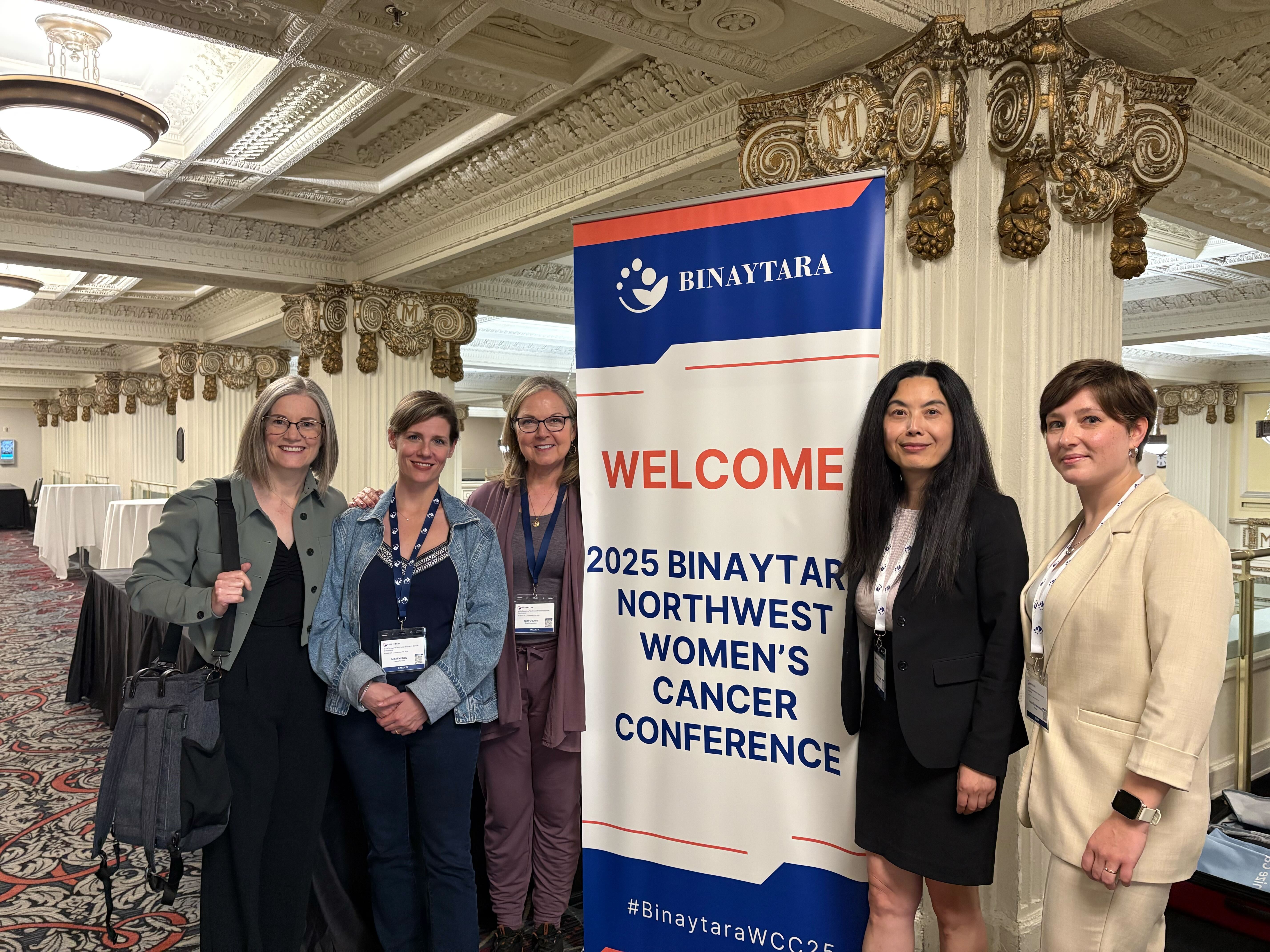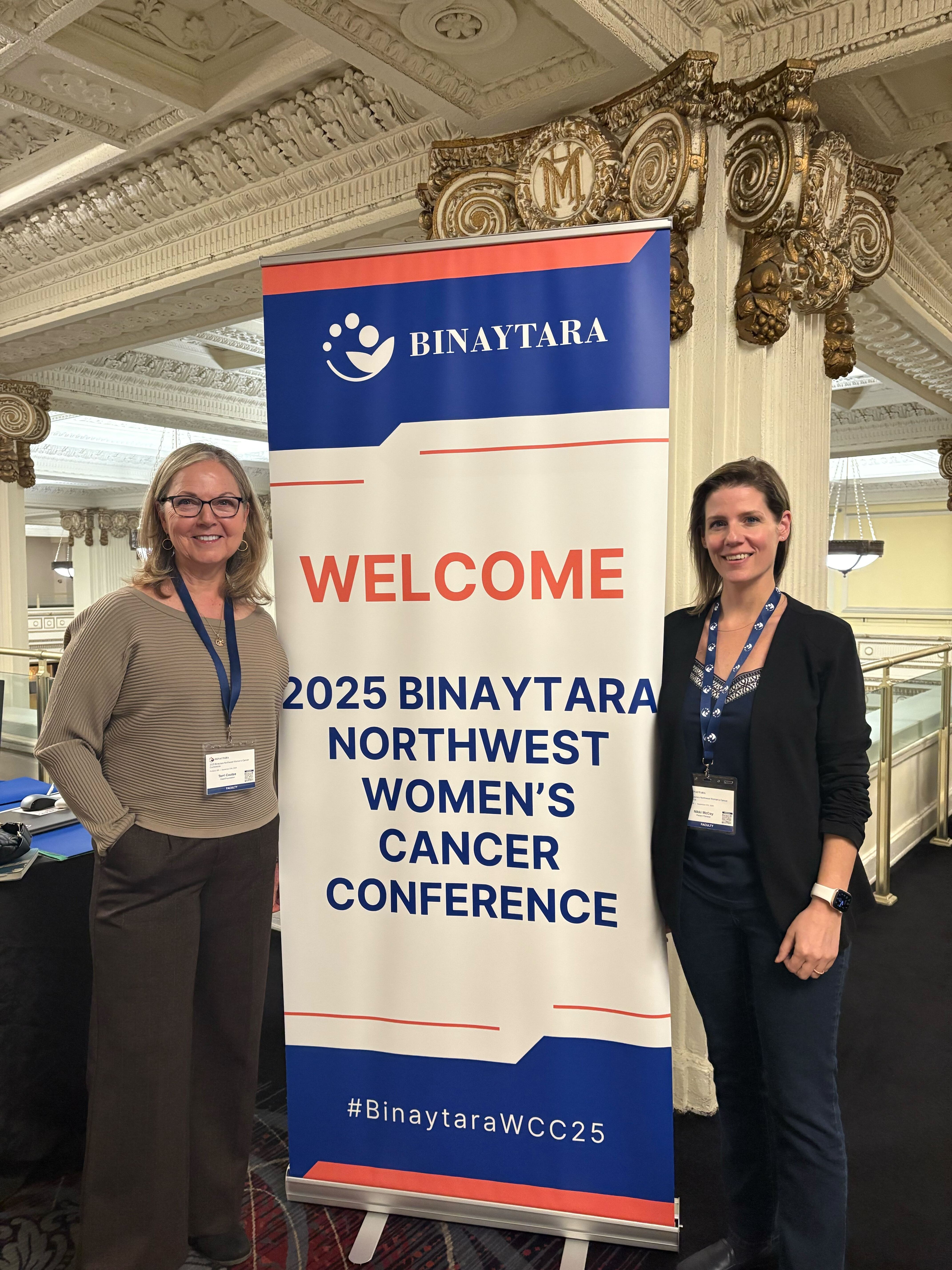Binaytara Opens Breast Cancer Awareness Month with Women’s Cancer Conference in Portland

Author
Binaytara Team
Binaytara opened Breast Cancer Awareness Month with the 2025 Northwest Women’s Cancer Conference in Portland, Oregon, bringing together national experts, patient advocates, and clinicians to advance women’s cancer care. Led by Dr. Fengting Yan of the Swedish Cancer Institute, the continuing medical education (CME) event emphasized clinical innovation, patient-centered care, and global health equity—core elements of Binaytara’s mission to minimize cancer disparities worldwide.
Fostering Collaboration and Impact During Breast Cancer Awareness Month
One of the goals of the World Health Organization’s 2025 Breast Cancer Awareness Month campaign is “to foster multisectoral partnerships by engaging stakeholders to co-create and amplify impact.” That is exactly what the 2025 Binaytara Northwest Women’s Cancer Conference achieved.
Binaytara kicked off Breast Cancer Awareness Month with the 2025 Binaytara Northwest Women’s Cancer Conference in Portland, Oregon. Led by Dr. Fengting Yan of the Swedish Cancer Institute, the continuing medical education conference brought together leading experts in breast and gynecologic cancers to discuss ways to improve clinical outcomes for patients. Following completion, participants can earn up to 5.25 MOC points, ACPE credits, AMA PRA Category 1 Credits, and Nursing Contact Hours.
October marks Breast Cancer Awareness Month, a time to raise awareness about a disease that claimed more than 670,000 lives worldwide in 2022. As part of our mission at Binaytara, we also seek to highlight the disparities that persist in low- and middle-income countries (LMICs).
Addressing Breast Cancer Disparities in Low- and Middle-Income Countries
Breast cancer remains a global challenge due to its high incidence, mortality, and the wide gaps in access to early detection and treatment. To open the conference, Justine Kam, Director of Development at Binaytara, presented the organization’s ongoing efforts to improve access to cancer care worldwide.
To illustrate the scale of the challenge: Nepal, with a population of 30 million—equivalent to nine U.S. states across the Pacific Northwest, Mountain region, and parts of the Midwest—has only 40 oncologists, compared to more than 2,000 in those U.S. states. For many Nepali patients, reaching an oncologist can require up to 10 hours by bus.
To help minimize this disparity, Binaytara established a Health Clinic in Janakpur, Nepal, which has already treated over 2,000 patients. We also launched a Center for Women’s Cancer and Advocacy, focused on expanding access to care through cervical cancer screening, breast self-exam education, and comprehensive prevention and early detection programs for women. To expand our impact and reach, we are building a 200-bed comprehensive cancer hospital that will serve more than 25 million people across Southern Nepal and Northern India.
Binaytara’s Global Women’s Cancer Initiatives: From Nepal to the Pacific Northwest
The scientific portion of the conference was intensely focused on practical, case-based learning, addressing some of the most pressing questions in oncology today, with a strong emphasis on breast cancer.
The day began with a critical debate on treatment de-escalation. In Session 1, “Can We Omit Sentinel Lymph Node Biopsy (SLNB) or Whole-Brain Radiation Therapy (WBRT)?”, experts, including Drs. Toni Storm, Kathleen Dunham, and Alice Wang-Chesebro, explored cases where omitting SLNB or WBRT may be a safe and beneficial approach for select patients.
Next, attention turned to the complexities of metastatic breast cancer in a session chaired by Dr. Alison K. Conlin. Case presentations from Drs. David Page, Sunny Kim, and Zheng Topp, along with a panel featuring renowned expert Dr. Nancy E. Davidson, examined the latest therapeutic strategies and evolving standards of care.
Running concurrently, a specialized breakout session for Advanced Practice Providers (APPs) and Pharmacists focused on the practical aspects of managing breast cancer patients. Chaired by Alison Ryan, PA-C, the forum underscored the essential role of the multidisciplinary care team in implementing complex treatment protocols and supporting patients throughout their journey.
Then, the third session featured one of the most universally relevant topics in oncology: managing treatment side effects and toxicities. Chaired by Diana Borrego, PharmD, and Molly Davis, MSN, and featuring cases from Drs. David Windler, Nora Bucher, and Fengting Yan, the discussion offered valuable insights into proactive symptom management. This was to ensure that patients not only live longer but also experience a better quality of life during and after treatment.
Patients and Advocates Lead the Conversation on Survivorship and Well-being
Session 4 on "Survivorship & Well-being" was notably guided by the patient and advocate perspective. The session was led by Amy BonDurant, MD, MSNE, a specialist in gynecologic oncology at Providence Regional Cancer Partnership and Providence Swedish Cancer Institute.
The session featured case presenters and panelists, including two prominent patient advocates who brought their lived experiences directly into the clinical discussion: Terri Coutee, founder of DiepCJourney, and Nikki McCoy, an author and breast cancer advocate. They discussed topics ranging from the importance of mental health to the role of lived experience in survivorship care.
Terri noted in her blog, “As a patient advocate, I appreciated the way presenters not only shared cutting-edge medical knowledge but also acknowledged the emotional and psychosocial challenges patients face. Nikki and I took abundant notes, eager to bring these insights back to our respective support communities.”
Together, these advocates brought a patient-centered perspective to the scholarly discussion, broadening oncologists’ insights and amplifying the voices of other breast cancer patients.

From left to right: Terri Coutee and Nikki McCoy at the Northwest Women’s Cancer Conference
Advancing Education, Advocacy, and Health Equity in Women’s Cancer Care
The conference concluded with a series of case-based discussions on gynecologic malignancies, featuring presenters from Providence Cancer Institute, Vancouver Cancer Center, and the Knight Cancer Institute. The highlighted cases covered endometrial, ovarian, and cervical cancers, presenting real-world clinical scenarios that engaged the audience in critical thinking and dialogue before the presenters proposed treatment plans.
A dynamic panel discussion followed, led by Drs. Christopher J. Darus, Weiya Wysham, Ross Harrison, and Jess Jou, who offered expert insights and perspectives on the cases presented.
Overall, the conference successfully bridged the gap between groundbreaking clinical research and its application at the patient’s bedside. The strong emphasis on breast cancer and the inclusion of patients’ voices throughout the day underscored the field’s shift toward more refined, less invasive, and better-managed treatment approaches.